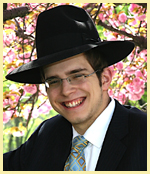Contemplate Before Pouncing
[Editor’s note: As a memory of my beloved brother Shaya, I would like to continue sending out his pearls of wisdom that he has shared with all of you in the past. For some of you this may ring a bell and for others it may appear to be totally new. May the learning of Shaya’s Divrei Torah inspire us to change our ways and thereby give an Aliya to the neshama of our dear beloved Shaya whom we miss so much.]
This week’s Haftorah begins with Yeshaya Hanavi’s famous words, ‘Nachamu nachamu ami yomar elokaychem,’ ‘Comfort comfort my nation, so says your G-d.’
The Medrash cryptically comments that when Yeshaya said the words ‘Nachamu nachamu Ami’, Klal Yisroel wanted to kill him; i.e. they were very upset with him, until he continued and said, ‘yomar elokaychem [so says your G-d].’
Why was Klal Yisroel so upset with Yeshaya, and how did he defuse their anger with the words, ‘yomar elokaychem???’
We have a tradition that when Klal Yisroel observes the Torah and Mitzvos, Hashem calls us ‘Ami’ [MY nation]. When Klal Yisroel does not act in accordance of Hashem’s commandments, the Navi refers to us as ‘Amaych’ [YOUR nation]. So when Klal Yisroel heard Yeshaya say ‘Nachamu nachamu AMI’, they thought Yeshaya was saying that he was calling them ‘Ami.’ The implication was that they were NOT considered Hashem’s nation, meaning Hashem was NOT happy with them, and had not forgiven them for their sins. This caused Klal Yisroel to be incensed with Yeshaya’s words of ‘Nachamu Nachamu Ami,’ which didn’t seem to be a Nechama. Therefore, Yeshaya continued ‘yomar ELOKAYCHEM’, that this was a Nevuah [prophesy] from HASHEM. HASHEM was calling Klal Yisroel, ‘Ami,’ as Hashem HAD forgiven them for their sins, and therefore, indeed, there was a Nechama!
[The above I saw from Rav Madshan Uruch]
Perhaps one lesson we can extract from this Medrash is to always allow a person to finish his or her statement before pouncing on their words! If we must ever confront someone publicly, we should know what his/her complete opinion is before speaking out. Often a quote we read or hear about a person may have been taken out of context.
Let us take this lesson to watch what we say and through that merit the ultimate Nechama with Moshiach and the rebuilding of the Beis Hamikdash in our days. |





